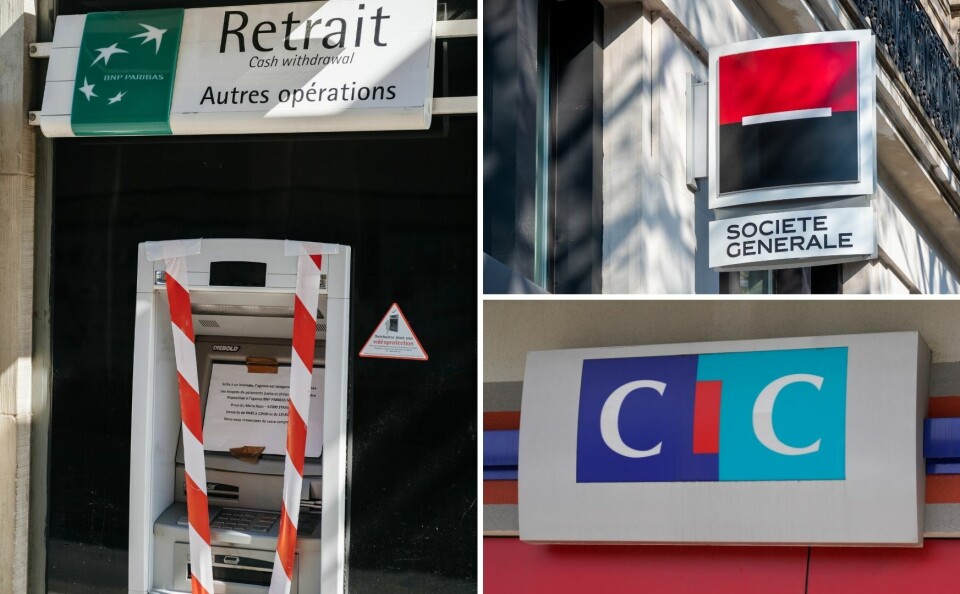-
French police issue warning over new ‘fake bank card’ scam
Accompanying letter asks users to set up new card using fake bank website and QR code
-
World corruption: France better than US but worse than UK
High-level public figures in France have a ‘feeling of impunity’, the ranking says
-
Best value 2026 Michelin French restaurants: Are there any near you?
Four regions did especially well on this year’s Bib Gourmand restaurant list
It is a mistake to close so many local banks, claims French think-tank
Economics expert says banks must learn from the Titanic: ‘being a giant does not save you from a shipwreck’

As figures show 3,500 bank branches have shut in France in the last 10 years, academic Jacques Marceau makes the case for keeping a local presence.
France still has more bank branches than most of its European neighbours, with 53 banks per 100,000 people, compared to an average of 38 per 100,000 across the EU.
It has nevertheless seen a sharp fall in local branches over the past decade, a trend that Jacques Marceau, of the economic think tank Fondation Concorde, wants to see halted.
Local banks fund entrepreneurs
The foundation, which recently published a report setting out its arguments to government and other decision-makers, concedes banks need to consolidate to compete internationally.
“But at the same time, we need to keep France’s network of local banks well implanted in the territories,” Mr Marceau said.
“They play a vital role in local economies – in getting fibre optic installed, for example – and funding local entrepreneurs.”
Banks less credible with customers
Mr Marceau said talking to businesses had convinced him of the importance of local banks.
“It is something that many banks themselves push in their advertising – the fact that they are there to listen, that they are local and prepared to contribute to the local economy.
“But at the same time, there is a paradox because many of the banks are moving their centres of control away from the territories to prepare for consolidation, which makes this message less and less credible.
“They forget the lesson of the Titanic – that being a giant does not save you from a shipwreck – and they act as if they are too big to fail.”
Regional banks swallowed up
He said a number of regional banking identities had disappeared, including Banque Scalbert-Dupont (a northern bank, now renamed CIC Nord Ouest) and Lyonnaise de Banque (also now renamed CIC).
Others, such as Crédit du Nord and its smaller regional banks including Banque Tarneaud (local in the Limousin and Périgord regions), are being absorbed into Société Générale.
“This consolidation is supported by some authorities, regulators and shareholders but it carries great risk,” Mr Marceau said.
Loss of banking expertise
Among the problems he foresees are local industries and entrepreneurs struggling to find finance, and banks starting to offer services that are unsuitable for some regions.
He also fears a loss of local banking experts, with their place being taken by specialists in off-shore management, and an increase in outsourced services such as IT, which could make banks more susceptible to global economic trends.
It will also have the effect of alienating certain customers.
“Effectively, by cutting the roots, banks run the risk of appearing to the public as an extra-territorial financial power, and lose their human touch, making it more and more difficult for the public to give them their confidence.
“It is particularly dangerous at this time because there are new players on the scene, especially the tech giants, making big strides in the payment sector.”
Technology can help local relationships
However, Mr Marceau said it was possible for the number of branches in France to continue to fall without regional banks losing their identity and local economic importance.
“It is easy to focus on the number of branches, but it must not become a fixation,” he said.
“We have to realise that millennials are now in the prime of their economic lives and they have grown up with a very different relationship to technology than older people have.
“With good technology and communication, a local relationship is still possible over the internet and without people physically going to the bank every week.”
Another French peculiarity, the co-existence of mutual, cooperative banks and those with a more traditional top-down structure, was also important.
“Most of the small mutual banks are very strong in their territories and they stimulate the listed banks to do better.
“We want to alert the powers-that-be of the importance of local banks at many levels.”
Related articles
Updated: Britline, BNP, Banque Postale: Your feedback on French banks
Banking in France without a mobile phone is near impossible
Why did Barclays, HSBC and ING banks struggle to make money in France?
























